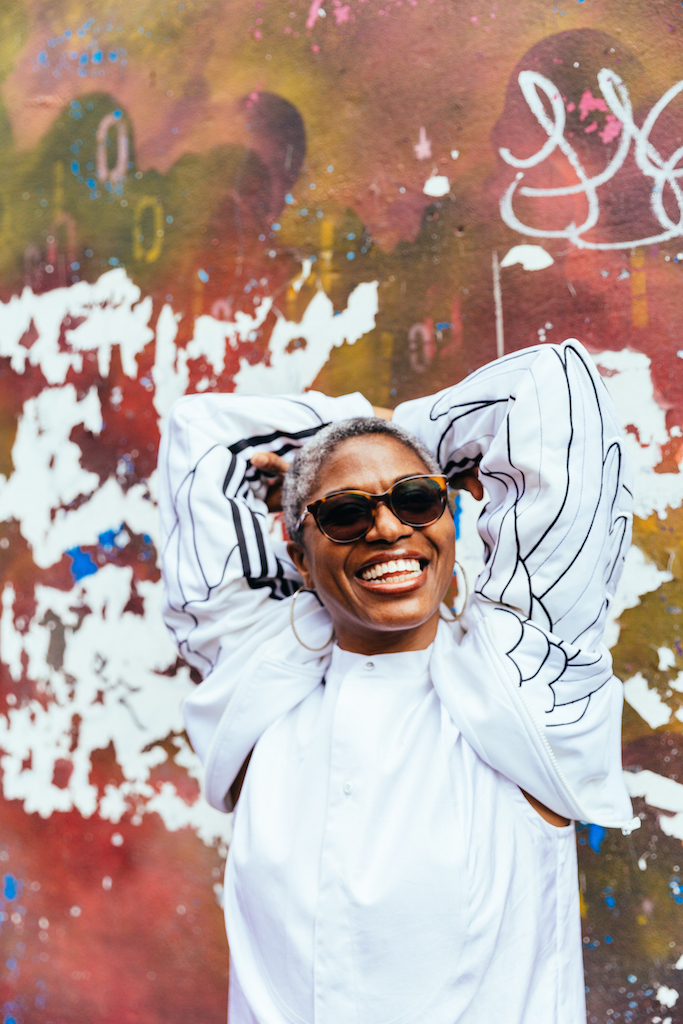Manchester born DJ Paulette is in Ibiza. The previous night she played an old boyfriend’s private birthday party and recounts how she broke with the serious ‘heads down’ vibe, choosing to play the kind of soul and house classics she was spinning when she first started DJing at the Haçienda. Back then she was Paulette Constable, a 24-year-old with an enviable record collection. She got her big break when organisers of the Haçienda’s gay night Flesh saw her debut DJ gig. Immediately impressed, they asked her to join them. She ended up staying for four and a half years and in the process became the legendary Manchester nightclub’s first female resident.
Being in Ibiza is a sort of homecoming for Paulette. After a decade in London, she moved to Paris in 2004, becoming resident at Redlight, Mix Club and Queen, getting a weekly radio show on Radio FG, and working alongside David Guetta and Bob Sinclar at the forefront of the early EDM scene (“before it was really cheesy,” she caveats). Arriving in Ibiza in 2013, she became resident at the legendary Pikes, and played clubs like Space, Pacha, Privilege and Eden.
But Paulette isn’t staying on the party island for long. The following morning she’s flying back to her hometown of Manchester for three gigs over the coming weekend and a meeting with The Lowry. The renowned Salford gallery has invited her to curate the third of their Edits series, set to open in September. Inspired by her magpie approach to music, art and fashion, Paulette’s edition — entitled Homebird — will be an interactive exhibition about her career.
Yet, when Paulette returned to Manchester two years ago, things weren’t looking as rosy as they are now. Paulette wasn’t sure she wanted to carry on DJing at all, having been a victim of three work-related sexual assaults, with the first taking place when she was booked to play a gig in Tel Aviv. “I was given a drink that was spiked and then I was attacked in my hotel room. It was horrific,” she recalls of the 2009 incident.
“It’s a lot of money for a lot of people and you’re just one voice against,” she says, in answer as to why there hasn’t yet been a #MeToo movement within clubbing, given how her story is an all too familiar tale among female selectors. “But I’d put money on it that there are some people terrified of switching on their computers and, if karma is real, #MeToo within music will happen. Either way, I think there should be more protection for people as there’s more drugs, drink and grey areas, compared to other industries.”
“#MeToo within music will happen. Either way I think there should be more protection for people as there’s more drugs, drink and grey areas, compared to other industries.”
With her experiences with predatory promoters leading her to turn down gigs abroad, Paulette found a safe haven back within Manchester’s bar culture, which she says was just coming to life when she left the city for London in 1994. Not only feeling like a safer work environment, playing the city’s Northern Quarter venues proved a good career move too: leading to opportunities like gigs at The Unambombers-owned Refuge, Flesh’s heir apparent Homoelectric and Parklife Festival. It also resulted in her meeting producer Chris Massey, with whom she recorded the Black Riot Records released punchy house track Sheroes, celebrating women DJs and producers.
Given that several historical texts focusing on the acid house-era have either omitted Paulette and her female contemporaries, or minimised their role within the scene, Paulette’s first attempt at rewriting history is surprisingly free of anger and bitterness. Her outlook is especially inspiring seeing as sexism isn’t the only difficulty she’s faced.
“I saw Honey Dijon mentioning on her Twitter stream not so long ago, ‘Where are all the black girls?’ And there are so many of us, but we don’t get the gigs,” she says. “There is a filter at work somehow.” She cites age as a third hurdle she has encountered, admitting, “it’s been a mission to keep working. Experience is devalued, the brand is paramount.” Equally, she expresses sympathy for a new generation of DJs: “When you’re DJing every night like Avicii, there’s no room for error, but your ears still go deaf and your mind will question whether you’ve played that record already. Doubt seeps in and saps your confidence.”
“If I hadn’t gone to Manchester I wouldn’t have been doing this exhibition now. It’s all about beginnings, not endings.”
Much like arena DJs today, Paulette too faced the mental strain of the repetitiveness that comes with being at the peak of your career. “Back in France I asked my agent, the radio station and Queen Club if I could change my music: they all said ‘no’. I was trapped. So I resigned,” she recalls. Having more opportunities to express herself is another reason why she’s so happy to be curating The Lowry’s Edits exhibition: “I’m ready to branch out,” she says, telling i-D the gallery got in touch when they read I Am The One, a poem she wrote for a job interview, but was too nervous to read and later posted on her website.
I Am The One is about “contradictions, self-mastery, acceptance and pride,” she says, and the exhibition will also explore those themes, drawing inspiration from feminist texts like The Yellow Wallpaper and Women Who Run with the Wolves, while aiming to invoke the spirit of Olafur Eliasson’s The Weather Project and Waterfalls. Crucially, it’s about endurance: “I didn’t give up in Paris and Ibiza when I thought it had gone to shit and I’m glad I went to Manchester,” Paulette concludes. “If I hadn’t gone to Manchester I wouldn’t have been doing this exhibition now. It’s all about beginnings, not endings.”

